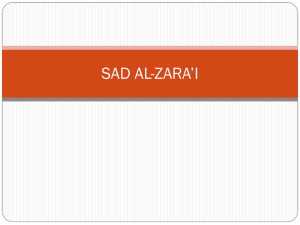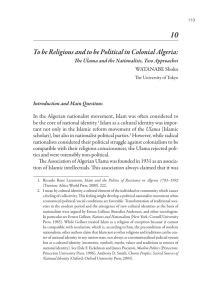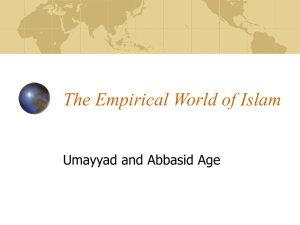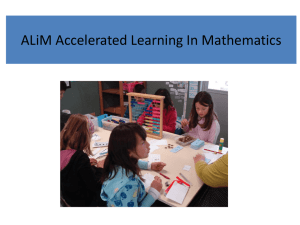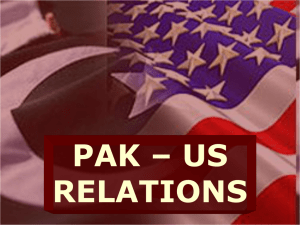Nabeela Ali - Woodrow Wilson International Center for Scholars
advertisement
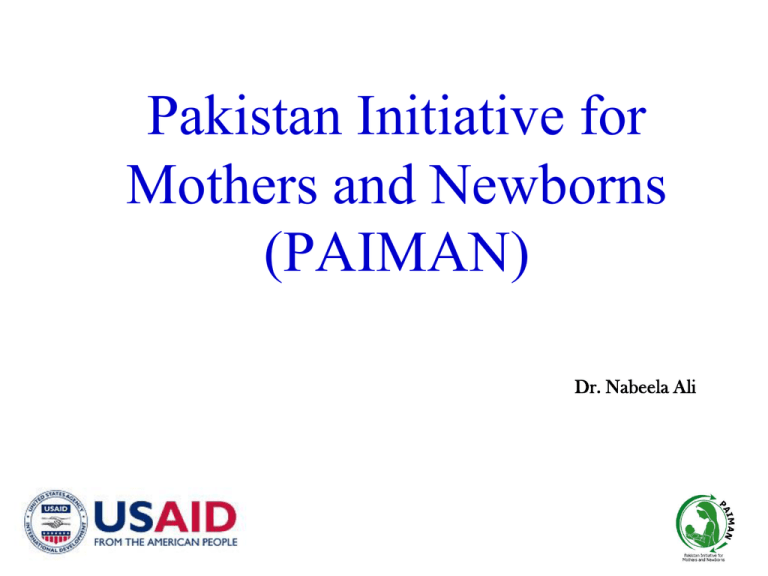
Pakistan Initiative for Mothers and Newborns (PAIMAN) Dr. Nabeela Ali • PAIMAN was a USAID funded project for six years • Implemented in 24 districts, 2 Agencies of FATA • The total population covered was 34 million. The PAIMAN Consortium John Snow Incorporated –Lead agency Johns Hopkins University/CCP Population Council Aga Khan University Save the Children USA CONTECH International Project Goal To reduce maternal, newborn, and child mortality in Pakistan, through viable and demonstrable initiatives Situation in Pakistan • • • • • • • Maternal Mortality Ratio: 276/100,000 live births IMR: 78/1000 live births NMR: 54/1000 live births U5MR: 94/1000 live births CPR: 30% TFR: 4.1 Unmet need 25% Pakistan Demographic Health Survey 2007 Ulama Project Engages the community’s most trusted and visible leaders to reach men, a critical audience in MNCH-FP, in districts with limited access to media. Ulama Project Objective Increase knowledge and involvement of men to improve MNCH FP in Pakistan Strategic Approach Orient, sensitize and encourage Ulama and other religious leaders to advocate for MNCH-FP in Friday sermons and other similar gatherings. Challenges • • • • • Diversity Male dominance Limited female literacy Reaching the unreached in conservative areas Disseminate key messages Selection of Areas and Mapping of Mosques • Most influential ulama with mosques / seminaries having sizeable Friday congregations • Preference to those in: – rural and far-flung areas – Areas with limited reach by Lady Health Workers; and • Limited reach of mass-media. Ulama Intervention Framework • • • • • Consultative meetings and collaborative concept development (not ‘training’) “Central Committee (Shora)” of renowned ulama Individual sensitization meetings with ulama by senior religious scholars Meetings with public health experts and ulama for message development based on core messages Women-delivered messages through women’s sermons Central Committee [7 members] National Team of Consultants District Pool In District-1 [Five Ulama] At least 50 Sensitized Ulama District Pool In District-II [Five Ulama] District Pool In District III [Five Ulama] District Pool In District IV [Five Ulama] At least 50 Sensitized Ulama At least 50 Sensitized Ulama At least 50 Sensitized Ulama Individual Sensitization Meetings • A team comprising one Alim from Central Committee, another from District Pool, a project officer and a public health expert pays exclusive visit to mapped Alim; • Advocate the Alim on MNCH issues in light of Islam and Shariah; ascertain the opinion of the Alim; • If receptive, present booklet on “Role of Ulama in Promoting Maternal and Child Health,” • Invite the Alim to attend the Group Meeting. Group Meetings • • • • Around 10 to 15 ulama At union council level Belonging to same sect Briefed on: – the Project, – state of MNCH-FP in the district – role of ulama in promoting MNCH issues Backstopping, Monitoring & Networking of ulama • Regular contact through networking visits, telephoning, and personal meetings • Directory of targeted ulama • Quarterly newsletter • Giveaway materials; and • Annual award for ulama for outstanding contribution to Project’s objectives. Ulama Project’s Results and Legacy • • • • Network of over 800 Ulama sensitized More than 200,000 men and women reached through MNCH sermons Innovative and successful model for mobilizing community resources to disseminate BCC Public health ‘champions’ to disseminate messages for family planning or birth spacing. Ulama Project Impact on Knowledge and Attitudes Based on 1,176 exit interviews, respondents indicated the following were necessary during pregnancy . . . 100 90 80 70 60 50 40 30 20 10 0 92 77 66 63 49 35 51 44 Non-intervention group 37 37 20 21 AN C 4 AN C i vis ts a Tr n or p s la tp n Fi ci n na al ille a pl d n rth bi n te t a nt a d e ac l P de f o e liv ry Sk PAIMAN Ulama Evaluation, 2009 Intervention group Ulama Project Impact on Knowledge and Attitudes Based on 1,176 exit interviews, respondents indicated the following were necessary following childbirth . . . 91 93 100 90 80 70 60 50 40 30 20 10 0 55 Non-intervention group 28 Intervention group s fo r2 ea s br Br e as t m ilk ve us i Ex cl ye ar ilk m ea st br ia te ed m Im tm ilk ilk m as t Br e tb at h 13 1s y 50 34 D el a 81 84 76 PAIMAN Ulama Evaluation, 2009 Do’s and Don'ts Dos Don’ts Approach Alim through well-known and influential ulama Do not approach an Alim through a technical person only Build arguments that are based on Quran and Hadith Do not say anything contrary to what the prevailing religious beliefs are Conduct interactive conversations and ask for assistance Do not lecture or sound authoritative Transfer ownership and keep the Alim involved Infrequent or seldom contacts with the Alim are nonproductive Ask Alim how the activity can be improved further, what assistance he requires Do not come to an Alim with a preplanned agenda which does not have any room for flexibility Bring realization on social and religious roles and responsibility of the Alim Do not give impression that this is what the “Project” needs General Gaps & Challenges Gaps: • 1) Projects mostly work with "easy to reach" ulama rather than those who are really influential. • 2) Projects have usually tailor made plans for working with Ulama rather than a learning strategy in which Ulama are equal stakeholders. • 3) Working with Ulama needs to be a program rather than a project Challenges: • 1) Mental models of development experts: We need to change our thinking towards Ulama. They are experts of their field and need to be treated with respect. • 2) Winning trust of Ulama: A difficult but most important first step. Ulama are mostly suspicious of development activities. Winning their trust is usually difficult. Quote “We are not against family planning. We need to call it discipline rather than planning. After all we want the best for our children and health of our women” Maulana Abdul Majeed Nadeem A Sunni Scholar Thank you!!! CA # 391-A-00-05-01037-00 project is funded by the United States Agency for International Development and implemented by JSI Research & Training Institute, inc. in conjunction with Aga Khan University, Contech International, Greenstar Social Marketing, JHU/CCP, PAVHNA, Population Council, Save the Children USA
